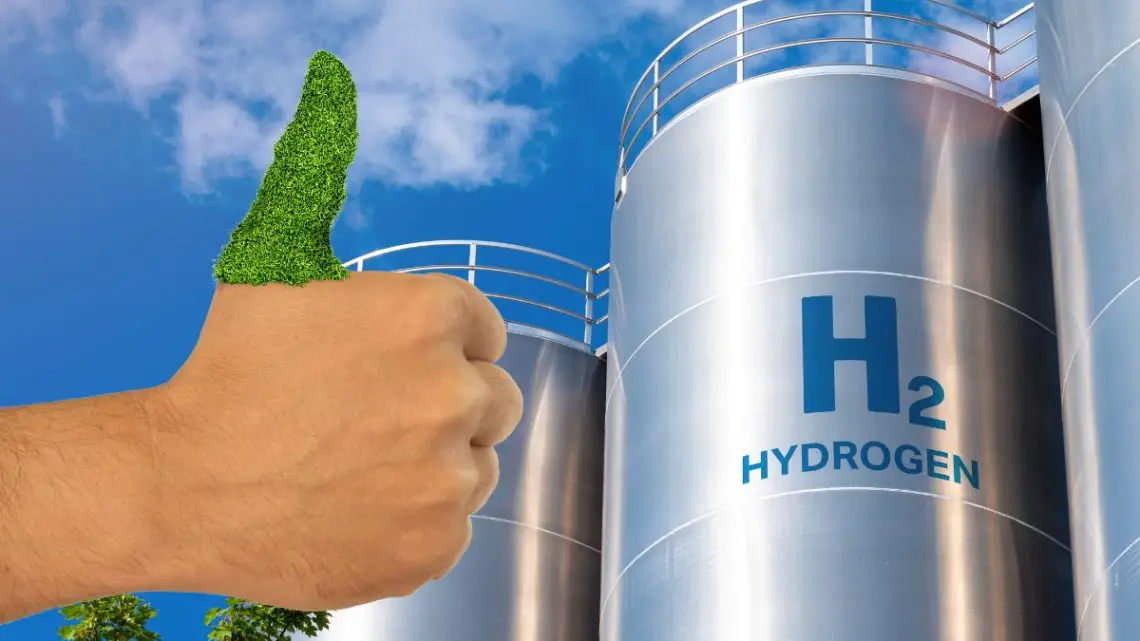
Bill Gates hooked on this hydrogen fuel and solid carbon startup
April 18, 2024The Microsoft co-founder was so taken by the product that he personally used it to fill a pothole.
Bill Gates recently visited a climate tech startup in the Seattle area called Modern Hydrogen, which is focused on the production of hydrogen fuel and solid carbon.
Solid carbon is one of the main ingredients comprising asphalt
The company developed a device that breaks down natural gas molecules to produce hydrogen fuel and solid carbon. Those products each have applications for lowering greenhouse gas emissions. H2 can be used as a carbon emission-free fuel, and solid carbon has a number of different industrial applications, including the aforementioned asphalt.
During Gates’ visit, he had the opportunity to have a look at the company’s methane pyrolysis reactor demo version. That equipment draws natural gas from biogas (such as manure) or fossil fuel sources to produce H2. That H2 can be used to power fuel cells or can be used as a source of energy for any number of industrial processing, such as in steel production.
“Bill was great,” said Modern Hydrogen CEO Tony Pan following Gates’ visit. “He was super engaged, hands-on.”
Hydrogen fuel is expected to play a vital role in decarbonization
Modern hydrogen has started the deployment of its demo reactors. Over the past few months, two customers have received the equipment and are now using it. The first is NW Natural in Portland, Oregon’s largest natural gas utility. The other customer is in Miami but their name has not been released.
More recently, the hydrogen fuel and solid carbon company opened a facility in Woodinville, Washington, where its second generation of the reactor is currently under development. This version will be larger and will be capable of manufacturing at the new Woodinville site.
Getting started
Modern Hydrogen first launched at Intellectual Ventures in 2015. At that time, it operated within that innovation hub under Nathan Myhrvold, a Microsoft researcher. It had Gates’ backing from that time, having been a founding investor who has visited several times since the company first started.

Bill Gates – Credit: Photo by depositphotos.com
“He likes the technical stuff,” said Pan about the Gates’ most recent visit. “He kind of nerded out,” about the new H2 technology during the tour of the location.
Modern Hydrogen’s original name was Modern Electron, and its focus was intended to be a focus on devices that would capture wasted heat from home appliances such as furnaces and hot water tanks by pairing with them and converting the heat into electricity. More recently, it changed tacks for a focus on hydrogen fuel.
Bill Gates is a strong supporter of hydrogen fuel
Gates is well recognized as a supporter of climate-focused research and has been a substantial investor in organizations with a similar focus. He created the climate research and investment organization called Breakthrough Energy, while simultaneously remaining an enthusiastic supporter of H2. Two years ago, he referred to hydrogen fuel as the “Swiss Army knife” of clean energy, due to its broad application potential.
What makes this company different?
Among the main challenges associated with using hydrogen fuel is that it is tricky to transport. Therefore, the company has focused on creating technology that will make it realistic to produce and use in the same place.
The Modern Hydrogen demo reactors are around half the size of a standard shipping location. Therefore, they are an appropriate size to fit nearly anywhere that H2 would be needed. Moreover, the reactors are also self-powered. While operating optimally, about a quarter of the H2 produced by the reactors is recycled into the system once again in order to generate more H2 for use.
About Modern Hydrogen’s Focus
The carbon byproduct is a solid
 As this method uses natural gas to produce hydrogen fuel, one of the byproducts of the process is carbon. That said, in this case, it is solid carbon, as opposed to the gas that would otherwise be released into the atmosphere.
As this method uses natural gas to produce hydrogen fuel, one of the byproducts of the process is carbon. That said, in this case, it is solid carbon, as opposed to the gas that would otherwise be released into the atmosphere.
Solid carbon can be used in a broad spectrum of applications, ranging from the production of rubber and tires to ink. That said, the company has specifically focused on using it to produce asphalt without the need for any additional processing. The solid carbon replaces some of the bitumen – a fossil fuel-derived product – used for binding the gravel and sand to make asphalt. The result is a notable reduction in the climate impact and cost of asphalt production, while also keeping the carbon from the H2 production captured.
Ready to test your knowledge on the most abundant element in the universe? Take our fun and engaging Hydrogen Quiz now!



 HFN News is your leading source for fresh hydrogen and renewable energy updates. Amid the fast-paced growth of hydrogen companies, we provide top-notch news and insights about this exciting sector. Our coverage spans from hydrogen cars to global sustainable initiatives, and we highlight the latest in green jobs and developing hydrogen hubs. We invite you to share your local hydrogen news and explore today’s renewable energy job listings on our site. Thanks for choosing HFN News as your trusted guide to the hydrogen and renewable energy world!
HFN News is your leading source for fresh hydrogen and renewable energy updates. Amid the fast-paced growth of hydrogen companies, we provide top-notch news and insights about this exciting sector. Our coverage spans from hydrogen cars to global sustainable initiatives, and we highlight the latest in green jobs and developing hydrogen hubs. We invite you to share your local hydrogen news and explore today’s renewable energy job listings on our site. Thanks for choosing HFN News as your trusted guide to the hydrogen and renewable energy world!

The pyrolysis of methane is not new technology and has already reached commercial scale by the Hazer Group in Australia: hazergroup.com.au which uses biomethane from a municipal anaerobic digester in Perth. Unlike this project by the company “Modern Hydrogen” that uses fossil methane feedstock, the Hazer process actually removes atmospheric carbon, so it is carbon negative.